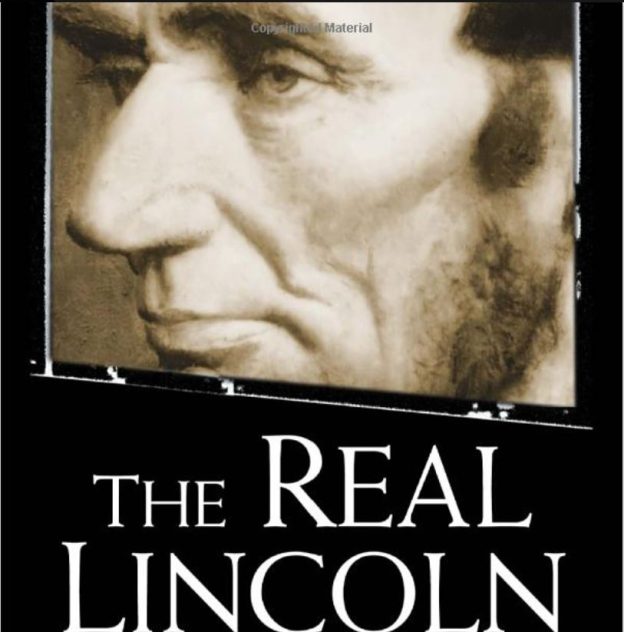Enron is not the topic of this column—Lincoln is. So why mention Enron in the same breath? Well, the system of subsidies and corporate welfare exemplified by the government-Enron incest is one of the pillars of policy that Lincoln—whose birth is celebrated today by some—dedicated his life to realizing.
Cretinous commentary in the media notwithstanding, Enron’s entanglement with the state has nothing to do with genuine capitalism. True capitalism ropes entrepreneurs into the service of only one master: the consumer. It allows no grants of government privilege, and it banishes corrupting interference by the political class.
Enron’s collapse relates to capitalism as Lincoln relates to liberty: not in the least. There is, however, a direct historical link between Abraham Lincoln and the phenomenon epitomized by the Enron fiasco. It is this link, among others, that Thomas J. DiLorenzo’s book, The Real Lincoln: A New Look at Abraham Lincoln, His Agenda, and an Unnecessary War, painstakingly traces.
Professor DiLorenzo documents Lincoln’s consummate and unrelenting devotion to the cause of “protectionist tariffs, taxpayer subsidies…for corporations,” and the nationalization of the money supply, so that governments could “simply print paper money in order to finance their special-interest subsidies.” At once, it becomes clear that Lincoln’s legacy lives on in the ugly specter of a Congress that uses the Export-Import Bank and the Overseas Private Investment Corporation as a routine money-laundering scheme, to hand over taxpayer-funded subsidies and grants to politically connected corporations.
This is Lincoln’s legacy in action.
As DiLorenzo shows, Lincoln’s political career was guided by “The American System,” the brainchild of his Whig idol, Henry Clay. Lincoln wanted to extend to politically favored industries in the north “legal protection from international competition through trade tariffs and quotas.” There is no better example of special-interest politics than protectionism and the corporate welfare schemes that Lincoln championed, where the force of the law is used to benefit a select group of politicians and their cronies, at the cost of limited choice and high prices for the consumer at large.
Lincoln was single-minded in this pursuit.
“The American System” had at its core a massive consolidation of power in the hands of a central government. The powers Lincoln sought were inimical to the Constitution of the founders. To realize his expansionist dream, Lincoln would have to crush any notion of the Union as a voluntary pact between sovereign states. The entire American political history, including the fact that America was born of secession, would have to be expunged, and secession tarnished as treason. Lincoln then would proceed to fabricate the notion that the federal government created the states, when the opposite was true.
Wait a sec…what about slavery?
No serious historian, says DiLorenzo, would claim that Lincoln invaded the South to free slaves. In Lincoln’s own famous 1862 words: “If I could save the Union without freeing any slave I would do it.” Here too, DiLorenzo exposes the Lincoln who could speak of the natural right to liberty from one corner of his mouth, and from the other corner express opposition to citizenship for blacks. Or the Lincoln who never once lent his legendary legal skills to a runaway slave, but did plead the case of a slave owner. Or the Lincoln who was devoted to—and attempted to implement—Henry Clay’s colonization ideas, namely the plan to send blacks packing back to Africa.
If anti-slavery sentiments were his muse, the dissembling Lincoln never let on until 1854, which is when he began getting religion on slavery.
Stripped of double-talk, Lincoln’s proclaimed primary objective was to destroy federalism and states’ rights. His victory included much more than waging a war that killed 620,000 young men. Lincoln’s “achievement” went beyond murdering roughly 50,000 Southern civilians, blacks included. His conquest transcended the destruction of the Southern economy, and lives on in the unconstitutional, violent and mob-dominated institution over which President Bush now smirkingly presides.
Having exposed every dank nook and cranny in Lincoln’s putrid pedigree, DiLorenzo understandably expresses sadness that the loss of states’ sovereignty—and by extension, individual sovereignty over the state—seems not to matter to most Americans.
As fine a Lincoln scholar as he is, DiLorenzo the economist is as valuable a presence throughout, dissecting for the reader the perverse incentives and consequent ruinous economic outcomes that Lincoln’s economic plank of nationalization and nepotism wreaked.
DiLorenzo has harnessed his passion for liberty and truth to give us a tightly argued, wonderful work.
© By ILANA MERCER
WorldNetDaily.com
February 12, 2002
*Credit for screen picture of image
CATEGORIES: Abraham Lincoln, Capitalism, Constitution, Federalism, History, Pseudo-History, War

 print
print